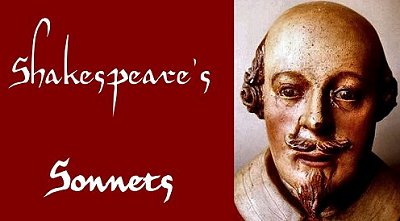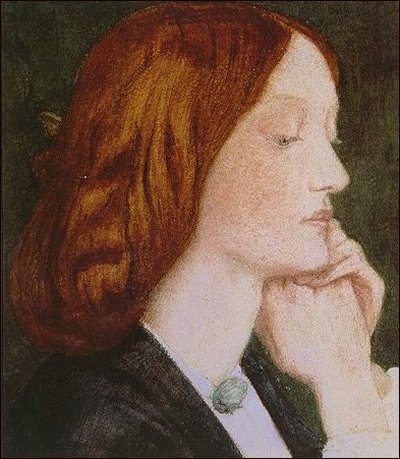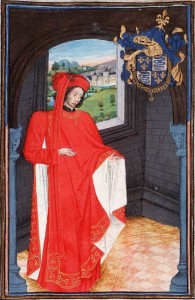Fleurs du Mal Magazine


Or see the index

William Shakespeare
(1564-1616)
THE SONNETS
120
That you were once unkind befriends me now,
And for that sorrow, which I then did feel,
Needs must I under my transgression bow,
Unless my nerves were brass or hammered steel.
For if you were by my unkindness shaken
As I by yours, y’have passed a hell of time,
And I a tyrant have no leisure taken
To weigh how once I suffered in your crime.
O that our night of woe might have remembered
My deepest sense, how hard true sorrow hits,
And soon to you, as you to me then tendered
The humble salve, which wounded bosoms fits!
But that your trespass now becomes a fee,
Mine ransoms yours, and yours must ransom me.
![]()
kempis.nl poetry magazine
More in: -Shakespeare Sonnets

De Tilburgse dichter Nick J. Swarth heeft onlangs de laatste hand gelegd aan zijn nieuwe bundel. De werktitel luidt ‘Mijn onsterfelijke lever’. Om de publicatie ervan mogelijk te maken werft hij fondsen. Gesteund door het Brabants Kenniscentrum Kunst & Cultuur (BKKC) heeft hij het project aangemeld bij de website www.voordekunst.nl. Op deze site kunnen mensen die de kunst een warm hart toedragen eenvoudig een bedrag doneren aan een project van hun keuze.
Een bijdrage kan worden gezien als een vorm van voorintekening. Bij het verschijnen wordt de bundel je dan toegezonden. Maar een meer ruimhartige schenking behoort zeker ook tot de mogelijkheden. En welk bedrag je ook bijdraagt, je krijgt er altijd iets voor terug. Zo is het mogelijk om een bundel te verwerven en daarnaast, voor een gering meerbedrag, eigenaar te worden van een uniek tekeningetje van de hand van Swarth, gesigneerd, ingelijst en wel. Het is de eerste keer dat hij met dit tekenwerk naar buiten treedt.
Voor een overzicht van de diverse tegenprestaties kun je terecht op www.voordekunst.nl
Het project loopt van 24 februari t/m 6 maart. Als het streefbedrag van € 3000 wordt gehaald zal de bundel in het voorjaar verschijnen. Bijdragen zijn welkom op: website voordekunst
fleursdumal.nl magazine
More in: Swarth, Nick J.

Ton van Reen
waalwijk-besoyen
Wat verloren sta ik in de Grotestraat
het oude huis waarin ik werd geboren
blijkt lang geleden met de grond gelijkgemaakt
de beelden in mijn hoofd bewaard, zijn afgebroken
thuis en tuin van toen zijn zoekgeraakt
Waar vroeger binnen was is buiten
of toch weer binnen in een ander huis
groter en leger met hoge blinde ruiten
Daar stond het ouderlijke bed, de lakens stijf gesteven
nu vind ik er een perk, viooltjes, gras, wat grind
een berk, geweven twijgen van een nest, de jongen uitgevlogen
vogels die zijn weggepest of net als ik zijn weggegaan
om na vervlogen jaren hier nog eens stil te staan
Een kinderstem kaatst door de straat
ik huiver, het is de echo van mijn broertjes roep
vijftig jaar geleden stond hij op de stoep
– broertje broertje, kom je buiten? –
Ik spiegel me in blinde ruiten
blinkend als de regenplas
waarin ik mezelf voor het eerst zag
een halve eeuw krast tekens in het glas
mijn naam, met vingers op de ruit geschreven
vertelt dat ik kind ben gebleven
– broertje broertje, kom je spelen?
broertje broertje, kom je buiten? –
Uit: Ton van Reen, Blijvend vers, Verzamelde gedichten (1965-2007). Uitgeverij De Contrabas, 2011, ISBN 9789079432462, 144 pagina’s, paperback
kempis.nl poetry magazine
More in: Archive Q-R, Reen, Ton van
![]()
Hartenklop
Naar elkaar bogen de lichamen zich
in de enigheid van de aanbidders
die ze waren, er was haar vrijmoedig-
heid en zijn weifelend verzet; ieder
moment met haar was een Hof van Eden
zilverspattend van een broosglanzend
licht, zij stichtte wanhoop in zijn geest, rede-
loos beliep hij zijn puinhopen, angsten
bestreed hij vergeefs, zo geschiedde dat
de kracht hem ontvlood haar te kozen, en
schonk een ander zijn apotheose, toch,
als hij haar ‘s nachts buiten bespiedt; mat
is zijn blik, te laat bevrijd vanbinnen
beslaat haar raam haar hartenklop.
Niels Landstra
Niels Landstra gedichten
kempis.nl poetry magazine
More in: Archive K-L, Landstra, Niels

ZEVENTIG WINTERS
Als zeventig winters
zijn voorbij gegleden
De lente zich niet meer wil laten zien
De man zijn rimpels al kan tellen
zijn hand bevend uit kan strekken
en begint te tasten in het niets
Worden foto’s opgeborgen
en kopjes die te veel leven maakten
rammelend in hun kastjes teruggezet
Sara Bidaoui
Bundel Sara Bidaoui vandaag verschenen
Sara Bidaoui: Tilburg: Mijn stad, mijn thuis
Gedichten van Tilburgs eerste Kinderstadsdichter
Uitgeverij Art Brut, ISBN: 978-90-76326-00-9
fleursdumal.nl magazine
14 maart 2012
More in: Archive A-B, Bidaoui, Sara, Kinderstadsdichters / Children City Poets

Elizabeth (Lizzie) Siddal
(1829-1862)
Fragment of a Ballad
Many a mile over land and sea
Unsummoned my love returned to me;
I remember not the words he said
But only the trees moaning overhead.
And he came ready to take and bear
The cross I had carried for many a year,
But words came slowly one by one
From frozen lips shut still and dumb.
How sounded my words so still and slow
To the great strong heart that loved me so,
Who came to save me from pain and wrong
And to comfort me with his love so strong?
I felt the wind strike chill and cold
And vapours rise from the red-brown mould;
I felt the spell that held my breath
Bending me down to a living death.
Elizabeth (Lizzie) Siddal poems
fleursdumal.nl magazine
More in: Archive S-T, Lizzy Siddal, Siddal, Lizzy

Charles d’ Orleans
(1394-1465)
Las ! Mort, qui t’a fait si hardie
Las ! Mort, qui t’a fait si hardie
De prendre la noble Princesse
Qui était mon confort, ma vie,
on bien, mon plaisir, ma richesse !
Puisque tu as pris ma maîtresse,
Prends-moi aussi son serviteur,
Car j’aime mieux prochainement
ourir que languir en tourment,
En peine, souci et douleur !
Las ! de tous biens était garnie
Et en droite fleur de jeunesse !
Je prie à Dieu qu’il te maudie,
Fausse Mort, pleine de rudesse !
Si prise l’eusses en vieillesse,
Ce ne fût pas si grand rigueur ;
ais prise l’as hâtivement,
Et m’as laissé piteusement
En peine, souci et douleur !
Las ! je suis seul, sans compagnie !
Adieu ma Dame, ma liesse !
Or est notre amour departie,
Non pourtant, je vous fais promesse
Que de prières, à largesse,
orte vous servirai de coeur,
Sans oublier aucunement;
Et vous regretterai souvent
En peine, souci et douleur.
Dieu, sur tout souverain Seigneur,
Ordonnez, par grâce et douceur,
De l’âme d’elle, tellement
Qu’elle ne soit pas longuement
En peine, souci et douleur !
Charles d’ Orleans poetry
fleursdumal.nl magazine
More in: Archive O-P, d'Orléans Charles

Taal aan weerszijden van het instrument
1.
De koffer, bewapend, riffbestendig,
klapt open om de gitaar af te stemmen
op aanstaande feestwarmte. Langoureus
als verhalen die de wijnstokkenplanter inzet
met aarde.
De handen, nog eens uitvallend
in een moment van plankenkoorts,
nagelen zich aan het noten vangend meidenkoor.
Geen beter braakpoeder voor zangers
dan een strak halssnoer van klinkers.
Hengelen naar genera van de gitaar:
aan de plastiek rond haar waagt zich
in zijn smidse van ritmes een stamelaar,
pooier van de kortste stilte.
2.
Harmonieuze katten, donker als dennenbomen,
slopen door het gras zonder enig geluid.
Ze wisten niet dat het gras ronddraaide.
De katten kregen katten, grijs sloeg het gras uit.
3.
De gitaren, ontladen van blauwe toonaarden,
rusten elk in een hoek van de kamer.
Daarstraks werden ze dicht bijeen alsmaar slechter horend gezelschap
nog opgeroepen als een waarachtig ding,
maar niet zo behandeld.
Ze willen nu
het rockmotief regelvast binnenrollen,
gezamenlijk drie octaven afleggen,
zonder later aan de spelers te moeten trekken of van hen terug te veren,
op eigen houtje snaren doen afspringen,
huiverend voor het open akkoord in nadat lang aangehouden hen ombuigen zal
tot gladde ratelslangen de wurging nabij.
4.
De straatmuzikant neemt een magere kat onder handen. Zoveel pels vernikkelt zijn eelt.
Hij luistert naar de resonanties achter haar gejank
en een vervalsing die daarin sluipt.
Haar darmen hangen te drogen boven de krater,
die zijn instrument aanzien geeft en opspaart wat nog
negen levens lang moet doorklinken.
Hij speelt goedgunstig, zoals de kat
uit het bedelzingen is geboren opnieuw in Nashville.
Met verwijzingen naar songs van Lovin’ Spoonful en naar
“The Man with the Blue Guitar” van Wallace Stevens.
Richard Steegmans
(Uit: Richard Steegmans: Ringelorend zelfportret op haar leeuwenhuid, uitgeverij Holland, Haarlem, 2005)
Richard Steegmans (Hasselt, 1952) is dichter en muzikant met een grote voorliefde voor rock, pop, soul, blues, country uit de jaren 60. Hij publiceerde de dichtbundels Uitgeslagen zomers, uitgeverij Perdu, Amsterdam, 2002, en Ringelorend zelfportret op haar leeuwenhuid, uitgeverij Holland, Haarlem, 2005. Gedichten van zijn hand verschenen in de literaire tijdschriften De Gids, Poëziekrant, Parmentier, DWB, Deus ex Machina, De Brakke Hond, Tortuca, Krakatau, Tzum en in talrijke bloemlezingen.
kempis.nl poetry magazine
More in: Archive S-T, Steegmans, Richard
![]()
Levenslus
Voor Ton de Witte 29 maart 1966 – 6 maart 2012
Het absoluut omgekeerde van leven
Alles in negatief zien, want kleuren zijn niet mooi
Alles is niet.
Niet hier maar daar kent niemand het.
Niet eens verveling, gewoon, nee niet gewoon.
Altijd de buitenstaander.
Lachen, maar waarom. De vragen voorbij.
Zo ver van erbij zijn, bij de anderen.
Mensen zijn zo vluchtig.
Wie kan het iets schelen hoe je bent,
Of je echt lacht of niet.
En wel zo gewoon.
Gewoon bestek, gewoon boodschappen, gewoon ansjovis
Gewoon mensen.
Maar altijd weten dat vragen ook maar vragen is.
Gewoon de afwas, gewoon een biertje, gewoon je buurman, gewoon de wc, gewoon de deurklink.
Gewoon de bank, gewoon de naden in je schoen, gewoon haren.
Gewoon waaien, gewoon slapen, gewoon knikken en je wapenen.
Gewoon ideeën.
Gewoon de oude doos, gewoon de rode huisjes van Monopoly.
Gewoon mee.
Gewoon je sperziebonen laten liggen.
Gewoon de blaadjes bezinken in je thee.
Was er geen klaagzang zoals in de films? Was het maar als in de films, dan komt er altijd een wijze man uit een oud dorp die bijtend op een graantje net die ene zin zegt die wegpinkt voor ‘t traantje.
Zou er licht zijn? Licht zo licht als een eindeloze zucht.
‘t Is geen vlucht, het is een sprong.
Een groot “waarom?” staat te kloppen maar het huis is te vol. Het staat te bonken maar is niet thuis.
Een vraag is al teveel. Als een vraag er is dan kun je nog door.
Het past niet, het hoofd te vol.
Het is niet laf, wie is er laf?
Beleefd voor het leven.
Het leven serieus nemen.
Juist dan zijn vragen maar vragen.
Alles in negatief zien, lachen en knikken.
Altijd beleefd voor het leven geweest.
Alles is niet. Nu niet.
Esther Porcelijn
Stadsdichter Tilburg
Ton de Witte (45) is dinsdag (6 maart 2012) plotseling overleden. Hij laat zijn collega’s bij De NWE Vorst in Tilburg in diepe rouw achter. Ton de Witte was de stuwende kracht achter de culturele stadswandelingen van L’Avventura en maakte naam als gedreven steunpilaar, vormgever en theatermaker van veel jonge acteurs en dansers.
fleursdumal.nl magazine
More in: Porcelijn, Esther, Porcelijn, Esther

William Shakespeare
(1564-1616)
THE SONNETS
119
What potions have I drunk of Siren tears
Distilled from limbecks foul as hell within,
Applying fears to hopes, and hopes to fears,
Still losing when I saw my self to win!
What wretched errors hath my heart committed,
Whilst it hath thought it self so blessed never!
How have mine eyes out of their spheres been fitted
In the distraction of this madding fever!
O benefit of ill, now I find true
That better is, by evil still made better.
And ruined love when it is built anew
Grows fairer than at first, more strong, far greater.
So I return rebuked to my content,
And gain by ills thrice more than I have spent.
![]()
kempis.nl poetry magazine
More in: -Shakespeare Sonnets
![]()
Niemandsland
De honden renden op wolken van woorden
Over de ruïnes van een vergaan seizoen
Staken herfstige beken over, de zon gloorde
In kronen van roodkoper en najaarsgroen
Het wazige licht verstilde aan de overkant
Raakte aan de adem van de oude dieren
En de vallende schaduw in het niemandsland
Van bos en hei waar wij liepen, bij de grienden
Hield je mij vast, alsof je onze teleurgang
Vergeten was, en neigde naar een verzoening
Terwijl je wist dat uit mij geen troost meer voortkwam
De hondenas heb ik alleen uitgestrooid, lang-
zaam verdort hun grond in mijn lege niemandsland
Waar ik jou vergeefs nog aanklamp, bij de grienden
Niels Landstra
Niels Landstra gedichten
kempis.nl poetry magazine
More in: Archive K-L, Landstra, Niels

Presentatie dichtbundel Tilburgs eerste kinderstadsdichter Sara Bidaoui
De Boekenweek gaat dit jaar bijzonder van start in Tilburg. Op woensdag 14 maart verschijnt namelijk een dichtbundel met werk van Tilburgs eerste Kinderstadsdichter: Sara Bidaoui. De bundel wordt op die dag feestelijk gepresenteerd in het bijzijn van leerlingen van Sara’s school, het Theresialyceum. Burgemeester Peter Noordanus, die ook een voorwoord bij de gedichten schreef, zal daar het eerste exemplaar aan de talentvolle jonge schrijfster overhandigen.
Verder zal Sara worden toegesproken door rector Tomas Oudejans en door bestuursvoorzitter Henriëtte de Kok van Bibliotheek Midden-Brabant. Ook verzorgen stadsdichter Esther Porcelijn en kinderstadsdichter Pleun Andriessen een optreden. De bundelpresentatie loopt van 10:15 uur tot 11:00 uur en is voor belangstellenden gratis toegankelijk.
Sara werd op Gedichtendag 2010 gekozen tot eerste kinderstadsdichter van Tilburg met haar gedicht ‘Tilburg: mijn stad, mijn thuis’. Dit is ook de titel van de bundel geworden, die verschijnt bij Uitgeverij Art Brut. Hierin zijn alle gedichten opgenomen die Sara schreef tijdens haar kinderstadsdichterschap, aangevuld met ander veelbelovend materiaal van haar hand. De bundel kon mede tot stand komen door een subsidie van de gemeente Tilburg. Om jong en oud in de gelegenheid te stellen om kennis te maken met het werk van Sara, kost de bundel slechts € 5.
Sara leest in de Boekenweek ook voor uit haar bundel op literair festival TiLT. Zij opent het programma op zaterdag 17 maart rond 20:15 uur in de Rode Salon van Theater De NWE Vorst.
De organisatoren van het project Kinderstadsdichter zijn Cultuurconcepten.nl, Bibliotheek Midden-Brabant en Stichting P.J. Cools. Zij willen met dit project kinderen laten kennismaken met het lezen en schrijven van poëzie, waardoor onder meer hun taalvaardigheid vergroot wordt.
Leerlingen van het Theresialyceum gaan ook nog aan de slag met thema stadsdichten: zij volgen in april een speciale workshop van Esther Porcelijn en voormalig stadsdichter Frank van Pamelen.
Informatie: Sara Bidaoui, Mijn stad, mijn thuis – Gedichten van Tilburgs eerste kinderstadsdichter, Uitgeverij Art Brut 2012. Prijs € 5, ISBN: 978-90-76326-00-9. Van af 14 maart verkrijgbaar in de boekhandel en via de website www.kinderstadsdichter.nl
Presentatie bundel: woensdag 14 maart, 10:15 uur -11:00 uur
Locatie: Theresialyceum – Prof. Cobbenhagenlaan 5 – 5037 DA Tilburg
Voordracht Sara Bidaoui: zaterdag 17 maart, 20:00 uur
Locatie: Theater De NWE Vorst – Willem II straat 49 – 5038 BD Tilburg
fleursdumal.nl magazine

More in: Archive A-B, Art & Literature News, Bidaoui, Sara, Kinderstadsdichters / Children City Poets
Thank you for reading Fleurs du Mal - magazine for art & literature